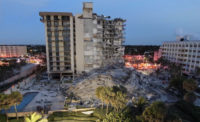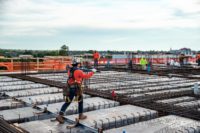Florida legislators have enacted structural inspection requirements for most of the state’s multi-family residential buildings, reversing an earlier, unsuccessful legislative effort aimed at preventing a repeat of last summer’s deadly partial collapse of the Champlain Towers South condominium in Surfside.
The new requirement, which establishes a statewide two-phase building recertification process similar to those already in place in Miami-Dade and Broward counties, comes two months after the state House and Senate were unable to agree on legislative proposals containing similar language.
Allen Douglas, executive director of the Florida Engineering Society (FES) and American Council of Engineering Companies of Florida, says the bills’ controversial aspects, unrelated to the statewide inspection mandate, ultimately doomed those measures.
“With so many other things going on during that session, legislators weren’t ready to make major changes to condominium safety requirements without fully understanding them,” Douglas adds.
An unexpected second opportunity to enact condominium safety requirements arose when Gov. Ron DeSantis (R) called the legislature back in late May for a weeklong special session to address instability in the state’s property insurance market, which has experienced rapid cost increases and insurer insolvency.
Douglas speculates that increasing reluctance among mortgage insurers to back aging condominiums, coupled with media blowback following legislators’ failure to act during the regular session, plus the fast approaching one-year anniversary of the Surfside collapse, spurred renewed interest in a statewide inspection mandate.
“Politically, they felt like they had to do something,” Douglas says.
Mirroring recommendations developed by a coalition of Florida building industry professional groups, the new inspection requirement applies to all condominium buildings three stories or taller. Those located within three miles of the coast must undergo safety inspections when the building reaches 25 years old, and again every 10 years afterward. Buildings located more than three miles inland will have the initial and follow-up inspection schedule beginning at age 30.
Florida’s counties must complete initial structural inspections on all eligible buildings by the end of 2024, an effort that Douglas says potentially may be complicated by uncertainty regarding the number of qualified structural engineers, which the state does not license by specialty.
According to FES/ACEC, nearly two-thirds of Florida’s 1.5 million condominium units are 30 years or older. More than 105,000 condominium units are more than 50 years old. Built in 1981, Champlain Towers South was 40 years old at the time of its partial collapse, and was undergoing recertification inspections as required by Miami-Dade County.
.jpeg?1653569245)




Post a comment to this article
Report Abusive Comment